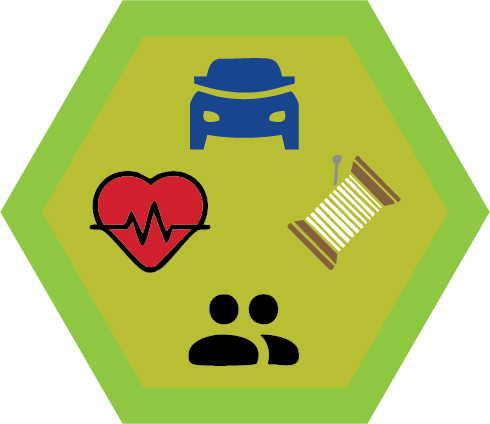Life Skills

The Life Skills Badge helps Scouts develop a variety of practical skills that are essential for independent living and personal growth. It covers areas such as health, household management, finance, social interactions, employment readiness, and transportation. Scouts learn how to maintain their physical and mental well-being, manage personal finances, care for their living spaces, communicate effectively with others, explore career options, and safely navigate transportation systems. By completing the requirements, Scouts gain valuable tools for responsible decision-making and become better prepared to take on adult responsibilities.
Life Skills Requirements Current Scouts BSA requirements
as of November 13, 2025
as of November 13, 2025
This Test Lab offering is valid until June 30, 2026.
Show additional resources
1.
Health. Do the following:
A.
Describe the steps to make a doctor’s appointment.
B.
Locate the hospital or urgent care center closest to your home.
C.
Explain what health insurance is and why it is important to have.
D.
Identify 5 ways to practice medication safety at home.
E.
Describe what information should be included in your personal
health record and create one for yourself.
F.
Identify 5 everyday situations where first aid would be required
and what to do when first aid is needed.
2.
Household. Do the following:
A.
Explain the steps required to do laundry. With your parent or
guardian’s permission, wash and dry one load of laundry.
B.
Explain the steps required to iron clothes. With your parent or
guardian’s permission, demonstrate how to iron two different
articles of clothing.
C.
Demonstrate your knowledge of sewing by sewing a patch or button on
a shirt or pair of pants.
D.
Explain the importance of maintaining a clean household. Describe
why it is important to control clutter. Demonstrate your knowledge
by cleaning your bedroom, bathroom, or kitchen.
E.
Demonstrate how to set a casual dining table and a formal dining
table.
3.
Money. Do the following:
A.
Explain what is required to open a bank account and compare the
differences between a traditional bank, an online bank, and a
credit union.
B.
Explain the importance of saving money.
C.
Explain what online bill pay is and compare the pros and cons of
paying your bills online.
D.
Describe how a credit card works, the reasons to get a credit card,
the costs you may incur by using a credit card, and how to use a
credit card effectively.
4.
Social. Do the following:
A.
Demonstrate how to properly introduce yourself in a social
situation.
B.
Explain what social etiquette means and how to practice it.
C.
Explain what it means to set personal boundaries and what to do
when those boundaries are crossed.
D.
Create a list of similarities and differences of the members of a
group you are involved with (troop, school club, sports team,
etc.). Share this list with your counselor and describe how these
similarities and differences affect the group.
E.
Explain how equity is different from equality. Describe a situation
that might exist in school, sports, an extra-curricular activity or
Scouting that could result in inequity.
F.
Give six examples of appropriate table manners
5.
Self-Care. Do the following:
A.
Explain what self-respect means and how you can demonstrate it.
B.
Explain to your counselor what might cause stress and how to manage
it.
C.
Explain the importance of good personal hygiene and give examples
of how to practice it.
D.
Explain the benefits of exercise and demonstrate three types of
exercise found in the fitness section of your Scouts BSA handbook.
6.
Employment. Do THREE of the following:
A.
Create a resume and review it with your counselor.
B.
Write a cover letter for a job posting and review it with your
counselor.
C.
Describe how to make a great impression during a job interview and
give 5 examples of questions that you would ask during an
interview.
D.
Explain why it is essential to write professional emails. Write a
professional email thanking someone for interviewing you for a job.
Share your email with your counselor.
E.
Demonstrate how to leave a professional voicemail message.
F.
Explain how posts to social media can affect you when applying for
a job.
7.
Transportation. Do TWO of the following:
A.
Explain what to do if you are involved in a car accident.
B.
Describe the steps on jumpstarting a car battery.
C.
Explain the benefits of regular car maintenance.
D.
Compare the differences between leasing versus buying a new car.
E.
On a map of your community or using an electronic device, locate
and point out the public transportation infrastructure. Plan how to
get to a friend’s home or shopping center from your house. Explain
the route and cost of the roundtrip to your counselor.
8.
Complete the survey below to complete the test lab requirements

